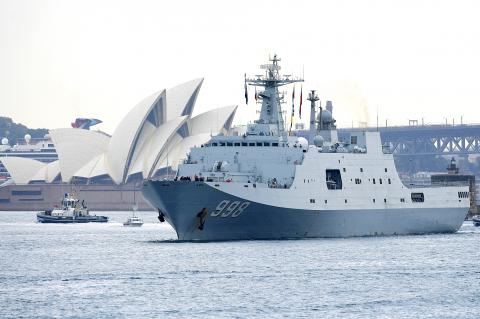Three Chinese warships yesterday sailed out of Sydney after an unannounced visit that came amid a tussle for influence between Australia and China in the Pacific Ocean.
The show-of-force call by a frigate, supply ship and amphibious warfare vessel was planned, but never announced by the Australian government.
“That raised a lot of hackles,” Australian National University professor of international security and intelligence studies John Blaxland told the Australian Broadcasting Corp.

Photo: EPA-EFE
“The ships arrived off Darling Point and other famous places in Sydney’s harbor without people knowing in advance ... and with armed soldiers and sailors on the decks of the ships looking fairly aggressive,” Blaxland said.
The vessels left for China under leaden skies in the afternoon.
The warships had arrived on the eve of the 30th anniversary of China’s bloody crackdown on pro-democracy protesters in and around Beijing’s Tiananmen Square on June 4, 1989.
Photographs showed members of Sydney’s Chinese community waiting at the navy wharf where the ships docked to greet the sailors.
“It was a reciprocal visit, because Australian naval vessels visited China,” Australian Prime Minister Scott Morrison told reporters earlier this week in the Solomon Islands’ capital, Honiara.
“So it may have been a surprise to others, but it certainly wasn’t a surprise to the government,” he added.
Ties between Australia and China hit a low last year, when Canberra passed laws aimed at thwarting Chinese influence in domestic affairs and also over China’s assertiveness in the disputed South China Sea.
Australia has offered diplomatic support to US “freedom of navigation” voyages through the region.

MAKING WAVES: China’s maritime militia could become a nontraditional threat in war, clogging up shipping lanes to prevent US or Japanese intervention, a report said About 1,900 Chinese ships flying flags of convenience and fishing vessels that participated in China’s military exercises around Taiwan last month and in January last year have been listed for monitoring, Coast Guard Administration (CGA) Deputy Director-General Hsieh Ching-chin (謝慶欽) said yesterday. Following amendments to the Commercial Port Act (商港法) and the Law of Ships (船舶法) last month, the CGA can designate possible berthing areas or deny ports of call for vessels suspected of loitering around areas where undersea cables can be accessed, Oceans Affairs Council Minister Kuan Bi-ling (管碧玲) said. The list of suspected ships, originally 300, had risen to about

DAREDEVIL: Honnold said it had always been a dream of his to climb Taipei 101, while a Netflix producer said the skyscraper was ‘a real icon of this country’ US climber Alex Honnold yesterday took on Taiwan’s tallest building, becoming the first person to scale Taipei 101 without a rope, harness or safety net. Hundreds of spectators gathered at the base of the 101-story skyscraper to watch Honnold, 40, embark on his daredevil feat, which was also broadcast live on Netflix. Dressed in a red T-shirt and yellow custom-made climbing shoes, Honnold swiftly moved up the southeast face of the glass and steel building. At one point, he stepped onto a platform midway up to wave down at fans and onlookers who were taking photos. People watching from inside

Japan’s strategic alliance with the US would collapse if Tokyo were to turn away from a conflict in Taiwan, Japanese Prime Minister Sanae Takaichi said yesterday, but distanced herself from previous comments that suggested a possible military response in such an event. Takaichi expressed her latest views on a nationally broadcast TV program late on Monday, where an opposition party leader criticized her for igniting tensions with China with the earlier remarks. Ties between Japan and China have sunk to the worst level in years after Takaichi said in November that a hypothetical Chinese attack on Taiwan could bring about a Japanese

STREAMLINED: The dedicated funding would allow the US to transfer equipment to Taiwan when needed and order upgraded replacements for stockpiles, a source said The US House of Representatives on Thursday passed a defense appropriations bill totaling US$838.7 billion, of which US$1 billion is to be allocated to reinforcing security cooperation with Taiwan and US$150 million to replace defense articles provided to the nation. These are part of the Consolidated Appropriation Act, which the US House yesterday passed with 341 votes in favor and 88 against. The act must be passed by the US Senate before Friday next week to avoid another government shutdown. The US House Committee on Appropriations on Monday unveiled the act, saying that it allocates US$1 billion for the Taiwan Security Cooperation Initiative